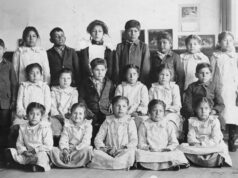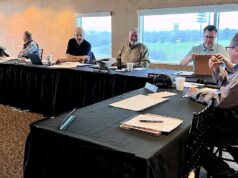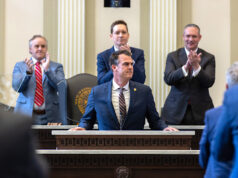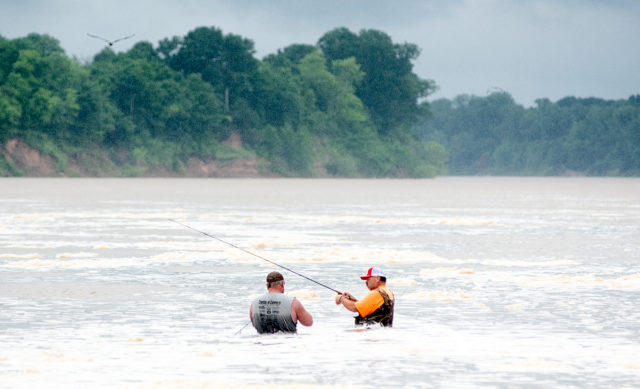
Gov. Kevin Stitt’s office confirmed Monday that he will not renew the state’s hunting and fishing compacts with the Cherokee Nation and Choctaw Nation, which are set to expire Dec. 31.
First signed into existence in 2015 and 2016, the agreements allowed the two tribes to purchase combination hunting/fishing licenses for their citizens at only 5 percent of the cost for other Oklahomans, including other tribal citizens. The increased registration of licenses, however, also boosted the draw down of federal dollars for the state and supported the hunting and fishing industry.
“[The compacts] clearly provided great financial and cultural benefit to both the state and tribal members,” Choctaw Nation Chief Gary Batton said in a press release. “Unfortunately, Gov. Stitt has once again decided to let his personal concerns outweigh what is best for the people he was elected to represent, putting conflict above cooperation.”
With the compacts set to expire at the end of the year, the situation opens the latest chapter in the legal standoff between Stitt and tribal leaders, which originated on the topic of casino gambling compacts and intensified after the historic 2020 U.S. Supreme Court ruling that has functionally affirmed a half-dozen Indian Country reservations in eastern Oklahoma.
Stitt has argued that the existing casino compacts, which a court said automatically renewed in 2020, are unfair to smaller tribes and non-tribal citizens who lack the ability to develop similar gambling businesses.
Regarding the Cherokee and Choctaw hunting and fishing compacts, Stitt’s chief of communications again focused on the idea of fairness, pointing to the price difference in the combination licenses: about $2 per license for Cherokee and Choctaw citizens; $42 per license for most other adults. (Adults who are not Choctaw or Cherokee and who purchase only a hunting license or only a fishing license pay $25 each.)
Under state law, hunters also are required to tag any deer or turkey they kill, and tags cost $20 or $10 each, respectively. The adult Choctaw compact license included six deer tags and four turkey tags — up to a $160 value. The adult Cherokee compact license included one deer tag and one turkey tag.
“Gov. Stitt believes that all Oklahomans should receive equal treatment under the law and offered both the Cherokee Nation and the Choctaw Nation the opportunity to enter into a compact to purchase licenses for their members by paying the same price as Oklahomans who are not tribal members,” Charlie Hannema said in a statement. “Personal attacks on the governor will not deter him from protecting the interests of all 4 million Oklahomans, including the state’s wildlife and natural resources.”
Letters between leaders
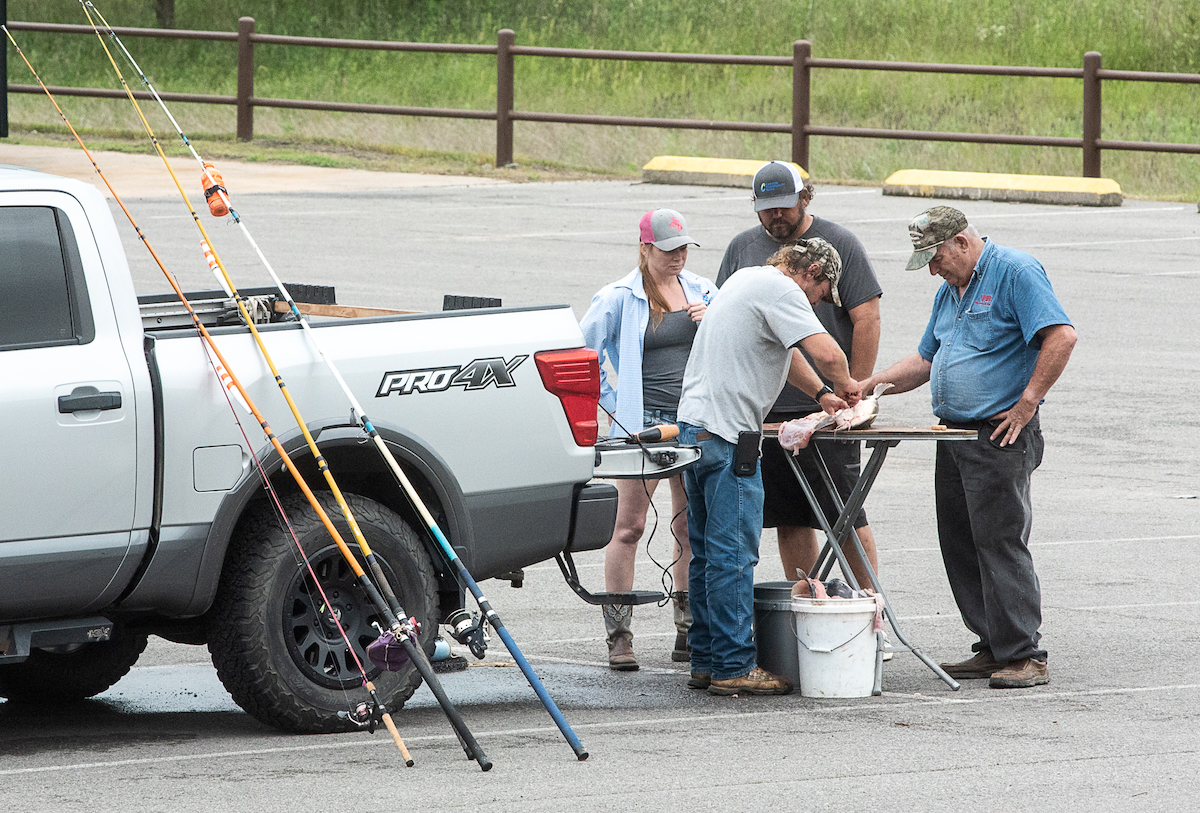
In sending his statement, Hannema provided a Nov. 30 letter sent by Lt. Gov. Matt Pinnell to Cherokee Nation Principal Chief Chuck Hoskin Jr. and Choctaw Nation Chief Gary Batton. In the letter, Pinnell pitched new hunting and fishing compacts:
As recently expressed by other representatives of the state of Oklahoma, the state would like to enter new Hunting & Fishing Compacts, which include terms that place all Oklahomans on equal footing.
Under the current compacts, members of the Cherokee Nation and the Choctaw Nation of Oklahoma are granted hunting and fishing licenses at steeply discounted rates as compared to Oklahoma citizens who are not members of either tribe. Because we firmly believe that all Oklahomans should receive equal treatment under the law and otherwise, we extend to each of you, on behalf of your respective tribes, the opportunity to enter Hunting & Fishing Compacts that allow your governments to purchase licenses for your members at the same price that other Oklahoma citizens pay for the same licenses.
Batton and Cherokee Nation Principal Chief Chuck Hoskin Jr. each wrote letters in response Dec. 13, and both addressed their letters to Stitt, not Pinnell. (Hoskin CC’d Pinnell at the bottom of his letter.)
“As I understand your communication of November 30, 2021, you have rejected our request for an extension,” Batton wrote. “I am not sure why the state has changed its view of this mutually beneficial compact. This is disheartening to hear because I truly thought that you wanted what was best for Oklahoma.”
Batton wrote that the Choctaw Nation “will begin exercising our jurisdiction to regulate hunting and fishing within our reservation boundaries and beyond.”
“Because of your failure to work together for all Oklahomans I must move forward in a way that exercises and strengthens the Choctaw Nation’s sovereignty and our federally protected rights,” Batton said in his letter, potentially teeing up an eventual court battle over who has jurisdiction to regulate hunting and fishing in eastern Oklahoma.
In his letter, Hoskin wrote that “various treaties” guarantee the hunting and fishing rights of Cherokee Nation citizens.
“We remain open to dialogue with state agencies on matters related to management of our shared wildlife resources in a spirit of mutual respect for the sovereignty of the Nation and the interests of the state,” Hoskin wrote.
Hoskin claimed the state’s compact with the Cherokee Nation had yielded $32 million in federal matching dollars for the state over six years. (Batton wrote that the Choctaw compact drew down $2 million annually for the state from the federal government.)
“Although the continuation of our compact would be an unquestionable win-win for the state and the nation, we understand that you have chosen to reject the path of cooperation,” Hoskin wrote. “Furthermore, we reiterate that your rejection of the compact will cost the citizens of Oklahoma tens of millions (of) dollars in federal funding that would otherwise be available to support wildlife conservation for future generations.”
Numbers show sales fell short of agreements

While the tribes provided an estimate of the state’s net financial impact from the Choctaw and Cherokee compacts, Oklahoma officials emphasized that federal matching funds derived from the U.S. Wildlife and Sport Fish Restoration Program are based on a complex formula involving total licenses, total acreage and other factors. They said calculations are difficult and ongoing this week.
But the Oklahoma Department of Wildlife Conservation’s annual reports outline the number of licenses sold in the state each year.
According to the department’s 2021 breakdown, the Cherokee Nation purchased 126,150 adult licenses and 1,164 youth licenses. The Choctaw Nation purchased 21,839 adult licenses and 1,527 youth licenses. At $2 each, the combined licenses yielded more than $301,000. Additionally, the Cherokee Nation compact requires payment of unspecified “administrative costs” to the state at the end of each year. The Choctaw Nation compact, meanwhile, requires an up-front payment of $200,000 to the ODWC and an additional $75,000 payment for “administrative costs.”
Both compacts also establish minimum license purchasing thresholds for the two tribes. The Choctaw Nation compact states that the tribe agrees to purchase a minimum of 50,000 licenses for citizens age 16 to 64 by June 30 of each year. The Cherokee Nation compact states that the tribe agrees to purchase and issue a minimum of 150,000 licenses for citizens age 16 to 65.
Statistics from ODWC, however, show that neither tribe has ever reached the minimum purchasing amounts agreed to in the compacts. Cherokee Nation license sales have hovered between 75 percent and 85 percent of the compact minimum. Choctaw Nation license sales have topped out around 43 percent of the compact minimum.
In addition, ODWC legislative liaison Corey Jager provided NonDoc with “average total revenue” figures for the five years of the Cherokee compact and the four years of the Choctaw compact.
The figures include only the non-federal sources of revenue, and they show an increase in state licensing revenue under the Choctaw compact, which was originally signed in August 2016:
- Choctaw compact licenses (including the $200,000 flat contribution): $339,390.75
- Choctaw tribal members purchases pre-compact: $282,237.38
- Net increase: $57,153.37
Signed in May 2015, the Cherokee compact resulted in figures — provided by Jager — that indicate the opposite:
- Cherokee compact licenses: $425,835.30
- Cherokee tribal member purchases pre-compact: $518,811.60
- Net decrease: $92,976.30
Jager also provided an overview of the compacts’ impact on ODWC’s federal revenues, first explaining the challenge of quantifying a precise figure.
“Each individual who has a hunting or fishing licenses is ‘certified’ with the USFWS as part of our federal grant funding formula. Each state’s apportionment of the federal funds is primarily based on total certifications and land area. The annual pot of money that is apportioned comes from various excise taxes on firearms, ammunition, certain sporting equipment, motor boat fuel etc.,” Jager said. “As these sales fluctuate year-to-year, and license sales vary for states on an annual basis, etc., this pot of money also fluctuates. Therefore, it is very hard to determine a total dollar value impact of the tribal licenses.”
Jager said the tribal licensing compacts have certainly increased the number of individuals certified with the federal program, which she said “has likely led to an increase in federal funding.”
“I would estimate that the tribal compacts led to an increase of about 100,000 certifications annually,” she said.
Follow @NonDocMedia on:
Tribes plan ‘collaborative effort’ to affirm rights
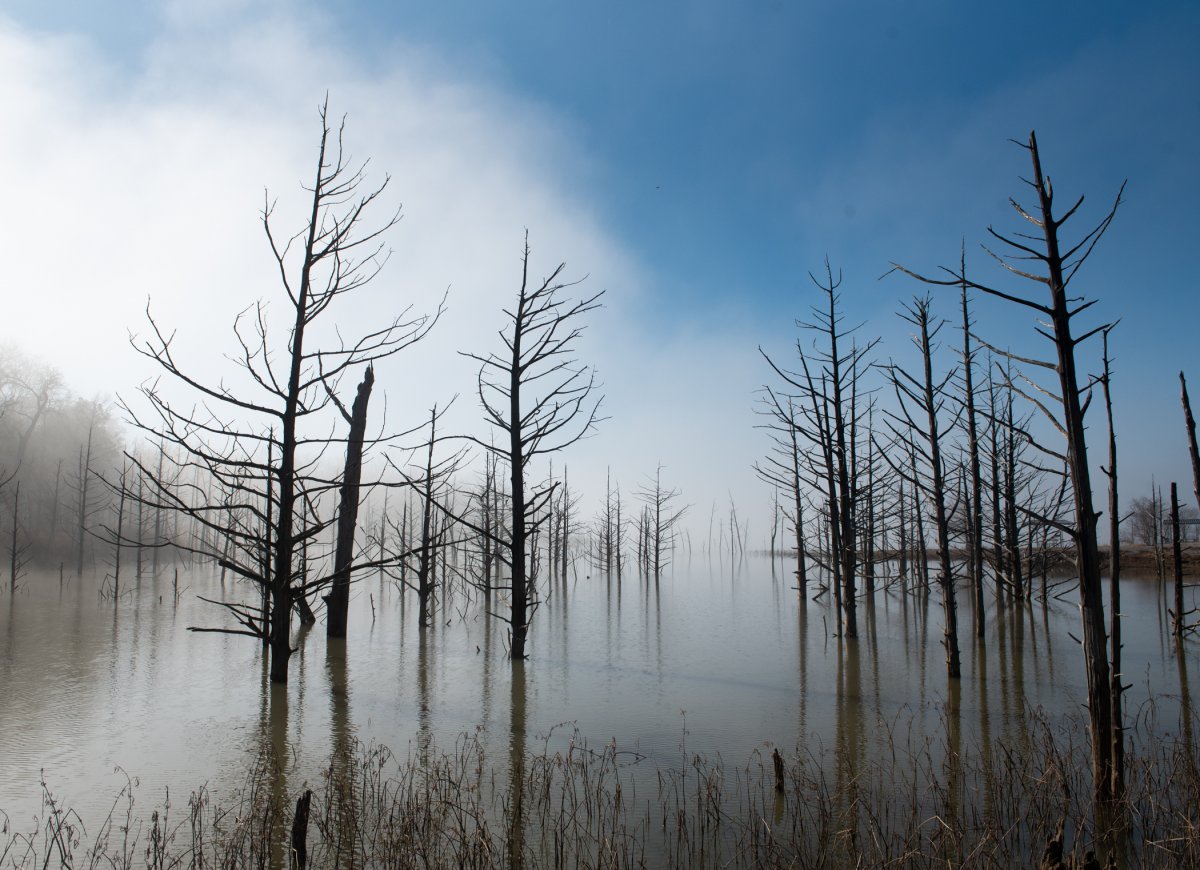
Although only two tribes in Oklahoma have hunting and fishing license compacts with the state, the press release sent Monday featuring quotes from Hoskin and Batton also included remarks from Chickasaw Nation Gov. Bill Anoatubby, Muscogee Nation Principal Chief David Hill and new Seminole Nation of Oklahoma Chief Lewis Johnson.
Even though their tribal citizens purchase hunting and fishing licenses directly from the state, Anoatubby, Hill and Johnson each referenced tribal citizen “rights” regarding hunting and fishing.
“The Seminole Nation since time immemorial has supported tribal sovereignty and remains at peace with other Indian tribes and supports our fellow tribes in calling for the methods and tactics of the governor of the state of Oklahoma to cease the acts of hostility on tribal sovereignty,” Johnson said.
Hill offered a similar assessment, saying Stitt’s “true intent is to demean tribal sovereignty.”
Anoatubby referenced a forthcoming “collaborative effort” on the topic.
“Wildlife conservation is an important aspect of our duty to protect and preserve our environment for future generations,” Anoatubby said. “Therefore, the Chickasaw Nation is joining the Cherokee, Choctaw, Creek and Seminole Nations in a collaborative effort to protect the hunting and fishing rights of our citizens while also preserving Oklahoma’s abundant wildlife for the benefit of our children and grandchildren.”
In his comment, Hoskin said Stitt knew the Cherokee and Choctaw compacts were a “win-win” because the governor had renewed them in 2019 and 2020.
“Unfortunately, this is consistent with what we’ve seen from the governor since the Supreme Court’s McGirt decision,” Hoskin said. “Whenever there is an opportunity to cooperate with tribes — whether on keeping criminals off the streets or on hunting and fishing rights — the governor has instead sought to undermine collaboration and claim McGirt created chaos. I promise the citizens of the Cherokee Nation that I will continue to aggressively defend our treaty rights and sovereignty against these attacks.”
The tribes’ press release referenced Stitt’s own December 2020 press release on the topic.
The governor praised the compacts when he extended them last year.
“I appreciate the Cherokee Nation working with my office and the Oklahoma Department of Wildlife Conservation on a one-year hunting and fishing compact extension,” Stitt said in 2020. “This compact continues a partnership between the State of Oklahoma and the Cherokee Nation to capture federal funds for conservation efforts across our state while promoting hunting and fishing opportunities for citizens of the Cherokee Nation.”










